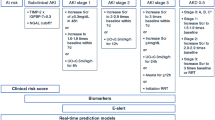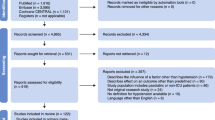Abstract
Mortality and morbidity from acute renal failure has not improved in pediatric or adult patients over the past 40 years. This lack of improvement stems from varied definitions for acute renal failure (ARF), changes in ARF epidemiology, and the reliance on changes in serum creatinine for ARF diagnosis. Significant research has occurred in the past 5 years to standardize ARF definitions, recognize ARF earlier, discover urinary biomarkers of early renal insult, and more optimally manage patients with ARF. As a result, changes in nomenclature from ARF to acute kidney injury and earlier institution of renal replacement therapy may lead to improvements in patient outcome. The aim of this editorial is to provide a description of the state of the art in pediatric ARF diagnosis and management by highlighting recent significant clinical and research progress.
Similar content being viewed by others
References
Bellomo R, Ronco C, Kellum JA, Mehta RL, Palevsky P (2004) Acute renal failure – definition, outcome measures, animal models, fluid therapy and information technology needs: 2nd Int Consensus Conf Acute Dialysis Quality Initiative (ADQI) Group. Crit Care 8:R204–R212
Chertow GM, Burdick E, Honour M, Bonventre JV, Bates DW (2005) Acute kidney injury, mortality, length of stay, and costs in hospitalized patients. J Am Soc Nephrol 16:3365–3370
Goldstein SL, Denfield S, Mott A, Chang A, Towbin J, Dickerson H, Dreyer J, Price J (2005) “Mild” renal insufficiency is associated with poor outcome in children with acute decompensated heart failure: evidence for a pediatric cardiorenal syndrome (abstract). J Am Soc Nephrol 16:534A
Arikan AA, Washburn K, Loftis L, Kennedy C, Jefferson LS, Goldstein SL (2005) Evaluation of the RIFLE criteria in critically ill children with acute kidney injury (abstract). J Am Soc Nephrol 16:534A
Pollack MM, Ruttimann UE, Getson PR (1988) Pediatric risk of mortality (PRISM) score. Crit Care Med 16:1110–1116
Mishra J, Dent C, Tarabishi R, Mitsnefes MM, Ma Q, Kelly C, Ruff SM, Zahedi K, Shao M, Bean J, Mori K, Barasch J, Devarajan P (2005) Neutrophil gelatinase-associated lipocalin (NGAL) as a biomarker for acute renal injury after cardiac surgery. Lancet 365:1231–1238
Han WK, Bailly V, Abichandani R, Thadhani R, Bonventre JV (2002) Kidney Injury Molecule-1 (KIM-1): a novel biomarker for human renal proximal tubule injury. Kidney Int 62:237–244
Parikh CR, Jani A, Melnikov VY, Faubel S, Edelstein CL (2004) Urinary interleukin-18 is a marker of human acute tubular necrosis. Am J Kidney Dis 43:405–414
Herget-Rosenthal S, Marggraf G, Husing J, Goring F, Pietruck F, Janssen O, Philipp T, Kribben A (2004) Early detection of acute renal failure by serum cystatin C. Kidney Int 66:1115–1122
Villa P, Jimenez M, Soriano MC, Manzanares J, Casasnovas P (2005) Serum cystatin C concentration as a marker of acute renal dysfunction in critically ill patients. Crit Care 9:R139–R143
Gallego N, Gallego A, Pascual J, Liano F, Estepa R, Ortuno J (1993) Prognosis of children with acute renal failure: a study of 138 cases. Nephron 64:399–404
Counahan R, Cameron JS, Ogg CS, Spurgeon P, Williams DG, Winder E, Chantler C (1977) Presentation, management, complications, and outcome of acute renal failure in childhood: five years’ experience. Br Med J 1:599–602
Gagnadoux MF, Habib R, Gubler MC, Bacri JL, Broyer M (1996) Long-term (15–25 years) outcome of childhood hemolytic-uremic syndrome. Clin Nephrol 46:39–41
Andreoli SP (2002) Acute renal failure. Curr Opin Pediatr 14:183–188
Williams DM, Sreedhar SS, Mickell JJ, Chan JC (2002) Acute kidney failure: a pediatric experience over 20 years. Arch Pediatr Adolesc Med 156:893–900
Mendley SR, Langman CB (1997) Acute renal failure in the pediatric patient. Adv Renal Replace Ther 4:93–101
Bunchman TE, McBryde KD, Mottes TE, Gardner JJ, Maxvold NJ, Brophy PD (2001) Pediatric acute renal failure: outcome by modality and disease. Pediatr Nephrol 16:1067–1071
Hui-Stickle S, Brewer ED, Goldstein SL (2005) Pediatric ARF Epidemiology at a Teritary Care Center from 1999 to 2001. Am J Kidney Dis 45:96–101
Lassnigg A, Donner E, Grubhofer G, Presterl E, Druml W, Hiesmayr M (2000) Lack of renoprotective effects of dopamine and furosemide during cardiac surgery. J Am Soc Nephrol 11:97–104
Baldwin L, Henderson A, Hickman P (1994) Effect of postoperative low-dose dopamine on renal function after elective major vascular surgery. Ann Intern Med 120:744–747
Tumlin JA, Finkel KW, Murray PT, Samuels J, Cotsonis G, Shaw AD (2005) Fenoldopam mesylate in early acute tubular necrosis: a randomized, double-blind, placebo-controlled clinical trial. Am J Kidney Dis 46:26–34
Samuels J, Finkel K, Gubert M, Johnson T, Shaw A (2005) Effect of fenoldopam mesylate in critically ill patients at risk for acute renal failure is dose dependent. Ren Fail 27:101–105
Rivers E, Nguyen B, Havstad S, Ressler J, Muzzin A, Knoblich B, Peterson E, Tomlanovich M (2001) Early goal-directed therapy in the treatment of severe sepsis and septic shock. N Engl J Med 345:1368–1377
Carcillo JA, Fields AI (2002) Clinical practice parameters for hemodynamic support of pediatric and neonatal patients in septic shock. Crit Care Med 30:1365–1378
Simmons RS, Berdine GG, Seidenfeld JJ, Prihoda TJ, Harris GD, Smith JD, Gilbert TJ, Mota E, Johanson WG Jr (1987) Fluid balance and the adult respiratory distress syndrome. Am Rev Respir Dis 135:924–929
Schuller D, Mitchell JP, Calandrino FS, Schuster DP (1991) Fluid balance during pulmonary edema. Is fluid gain a marker or a cause of poor outcome? Chest 100:1068–1075
Humphrey H, Hall J, Sznajder I, Silverstein M, Wood L (1990) Improved survival in ARDS patients associated with a reduction in pulmonary capillary wedge pressure. Chest 97:1176–1180
Gillespie RS, Seidel K, Symons JM (2004) Effect of fluid overload and dose of replacement fluid on survival in hemofiltration. Pediatr Nephrol 19:1394–1399
Foland JA, Fortenberry JD, Warshaw BL, Pettignano R, Merritt RK, Heard ML, Rogers K, Reid C, Tanner AJ, Easley KA (2004) Fluid overload before continuous hemofiltration and survival in critically ill children: a retrospective analysis. Crit Care Med 32:1771–1776
Michael M, Kuehnle I, Goldstein SL (2004) Fluid overload and acute renal failure in pediatric stem cell transplant patients. Pediatr Nephrol 19:91–95
Goldstein SL, Somers MJ, Brophy PD, Bunchman TE, Baum M, Blowey D, Mahan JD, Flores FX, Fortenberry JD, Chua A, Alexander SR, Hackbarth R, Symons JM (2004) The Prospective Pediatric Continuous Renal Replacement Therapy (ppCRRT) Registry: design, development and data assessed. Int J Artif Organs 27:9–14
Goldstein SL, Somers MJ, Baum MA, Symons JM, Brophy PD, Blowey D, Bunchman TE, Baker C, Mottes T, McAfee N, Barnett J, Morrison G, Rogers K, Fortenberry JD (2005) Pediatric patients with multi-organ dysfunction syndrome receiving continuous renal replacement therapy. Kidney Int 67:653–658
Proulx F, Fayon M, Farrell CA, Lacroix J, Gauthier M (1996) Epidemiology of sepsis and multiple organ dysfunction syndrome in children. Chest 109:1033–1037
Proulx F, Gauthier M, Nadeau D, Lacroix J, Farrell CA (1994) Timing and predictors of death in pediatric patients with multiple organ system failure. Crit Care Med 22:1025–1031
Goldstein SL, Currier H, Graf C, Cosio CC, Brewer ED, Sachdeva R (2001) Outcome in children receiving continuous venovenous hemofiltration. Pediatrics 107:1309–1312
Flynn JT (2002) Choice of dialysis modality for management of pediatric acute renal failure. Pediatr Nephrol 17:61–69
Bunchman TE, Maxvold NJ, Kershaw DB, Sedman AB, Custer JR (1995) Continuous venovenous hemodiafiltration in infants and children. Am J Kidney Dis 25:17–21
Brophy PD, Somers MJ, Baum MA, Symons JM, McAfee N, Fortenberry JD, Rogers K, Barnett J, Blowey D, Baker C, Bunchman TE, Goldstein SL (2005) Multi-centre evaluation of anticoagulation in patients receiving continuous renal replacement therapy (CRRT). Nephrol Dial Transplant 20:1416–1421
Bunchman TE, Maxvold NJ, Barnett J, Hutchings A, Benfield MR (2002) Pediatric hemofiltration: Normocarb dialysate solution with citrate anticoagulation. Pediatr Nephrol 17:150–154
Warady BA, Bunchman T (2000) Dialysis therapy for children with acute renal failure: survey results. Pediatr Nephrol 15:11–13
Book K, Ohqvist G, Bjork VO, Lundberg S, Settergren G (1982) Peritoneal dialysis in infants and children after open heart surgery. Scand J Thorac Cardiovasc Surg 16:229–233
Sorof JM, Stromberg D, Brewer ED, Feltes TF, Fraser CD Jr (1999) Early initiation of peritoneal dialysis after surgical repair of congenital heart disease. Pediatr Nephrol 13:641–645
Stromberg D, Fraser CD Jr, Sorof JM, Drescher K, Feltes TF (1997) Peritoneal dialysis. An adjunct to pediatric postcardiotomy fluid management. Texas Heart Inst J 24:269–277
Fleming F, Bohn D, Edwards H, Cox P, Geary D, McCrindle BW, Williams WG (1995) Renal replacement therapy after repair of congenital heart disease in children. A comparison of hemofiltration and peritoneal dialysis. J Thorac Cardiovasc Surg 109:322–331
Askenazi DJ, Feig DI, Graham NM, Hui-Stickle S, Goldstein SL (2006) 3–5 year longitudinal follow-up of pediatric patients after acute renal failure. Kidney Int 69:184–189
Veltri MA, Neu AM, Fivush BA, Parekh RS, Furth SL (2004) Drug dosing during intermittent hemodialysis and continuous renal replacement therapy: special considerations in pediatric patients. Paediatr Drugs 6:45–65
Author information
Authors and Affiliations
Corresponding author
Rights and permissions
About this article
Cite this article
Goldstein, S.L. Pediatric acute kidney injury: it’s time for real progress. Pediatr Nephrol 21, 891–895 (2006). https://doi.org/10.1007/s00467-006-0173-8
Received:
Revised:
Accepted:
Published:
Issue Date:
DOI: https://doi.org/10.1007/s00467-006-0173-8




